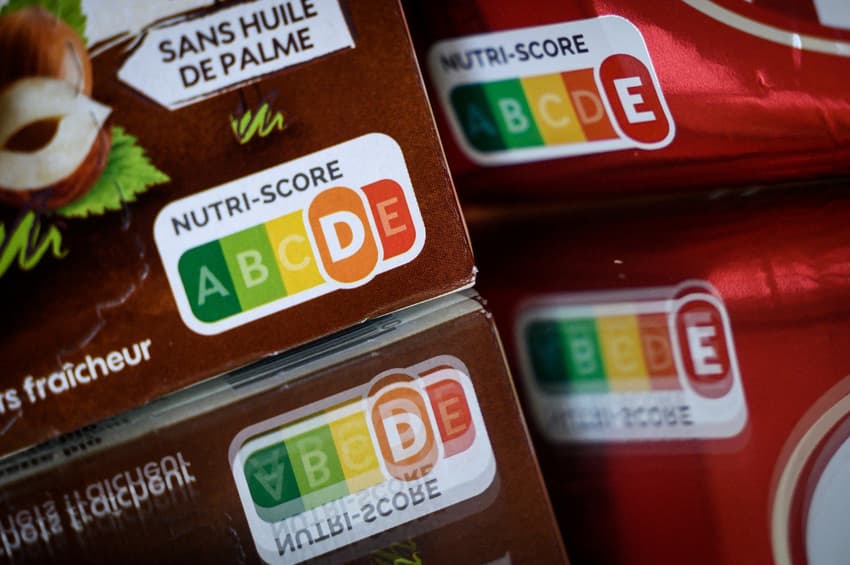Nutri-score: What you need to know about France's stricter nutritional ratings

France has introduced stricter methods for how it calculates the Nutri-score nutritional quality ratings on food items.
Anyone who has gone to a French grocery store would be familiar with the Nutri-Score label, which resembles a traffic light and ranks food products based on their nutritional value.
At the start of 2024, stricter methods for calculating the nutritional quality of food were introduced, mleaning several items will see their scores downgraded.
The label is regulated by public health authorities, who assess the list of ingredients considering things like fibre, fat, sugar, and salt. Then, they assign a score from A (dark green, most nutritious) to E (dark orange, least nutritious).
READ MORE: Bio, artisan and red label: What do French food and drink labels really mean?
The changes introduced at the start of the year focus on salt and sugar quantities. For example, breakfast cereals are expected to be penalised for high sugar contents.
When it comes to beverages, French media Usine Nouvelle reported that only water will remain at the 'A' level. Other drinks, including milk products, will drop down in score.
Red meat will also fall below poultry on the Nutri-Score, according to La Depeche.
READ ALSO: Nutri-score- How does France's health food labels work?
Conversely, some products will see there Nutri-Score increase. This is likely to be the case for certain vegetable oils, wholegrain cereals and fish, according to Franceinfo.
Faced with downgraded scores, some products may simply stop displaying the label, as it remains optional in France.
While the French health ministry has encouraged its use, ultimately it is the decision of food companies as to whether they wish to employ it. The EU has discussed making the label compulsory, but as of 2024 a consensus had not yet been reached.
Studies have shown that the Nutri-Score label influences behaviour, with consumers preferring products with higher ratings. Belgian researchers observed that, when faced with choosing a product within the same category, people opted for those C-ratings over D-ratings.
Comments
See Also
Anyone who has gone to a French grocery store would be familiar with the Nutri-Score label, which resembles a traffic light and ranks food products based on their nutritional value.
At the start of 2024, stricter methods for calculating the nutritional quality of food were introduced, mleaning several items will see their scores downgraded.
The label is regulated by public health authorities, who assess the list of ingredients considering things like fibre, fat, sugar, and salt. Then, they assign a score from A (dark green, most nutritious) to E (dark orange, least nutritious).
READ MORE: Bio, artisan and red label: What do French food and drink labels really mean?
The changes introduced at the start of the year focus on salt and sugar quantities. For example, breakfast cereals are expected to be penalised for high sugar contents.
When it comes to beverages, French media Usine Nouvelle reported that only water will remain at the 'A' level. Other drinks, including milk products, will drop down in score.
Red meat will also fall below poultry on the Nutri-Score, according to La Depeche.
READ ALSO: Nutri-score- How does France's health food labels work?
Conversely, some products will see there Nutri-Score increase. This is likely to be the case for certain vegetable oils, wholegrain cereals and fish, according to Franceinfo.
Faced with downgraded scores, some products may simply stop displaying the label, as it remains optional in France.
While the French health ministry has encouraged its use, ultimately it is the decision of food companies as to whether they wish to employ it. The EU has discussed making the label compulsory, but as of 2024 a consensus had not yet been reached.
Studies have shown that the Nutri-Score label influences behaviour, with consumers preferring products with higher ratings. Belgian researchers observed that, when faced with choosing a product within the same category, people opted for those C-ratings over D-ratings.
Join the conversation in our comments section below. Share your own views and experience and if you have a question or suggestion for our journalists then email us at [email protected].
Please keep comments civil, constructive and on topic – and make sure to read our terms of use before getting involved.
Please log in here to leave a comment.